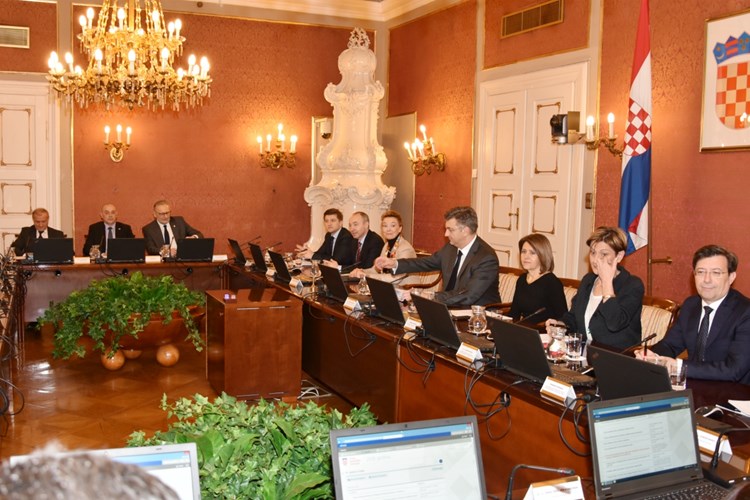


This judicial mini-reform, which was on the agenda of the government meeting on Thursday, includes amendments to the laws on courts, the State Judicial Council, the state prosecutors' offices, the State Prosecutors' Council, the areas and seats of the courts and the areas and seats of the state prosecutors' offices.
Plenkovic said that the proposed amendments would improve the method of selection of the Supreme Court President and the Chief State Prosecutor. He added that these bills were a step forward in increasing the responsibility, objectivity, independence and impartiality of the Croatian judicial system.
The Croatian government on Thursday adopted a plan for the use of funds from the sale of greenhouse gas emission allowances at auctions in Croatia by 2020, projecting total revenue from trading in greenhouse gas emissions at HRK 867.5 million.
The plan was adopted to ensure proper and effective use of funding for the implementation of measures to alleviate climate change and adjust to it in accordance with the Air Protection Act.
Croatia has been allocated a quota of 18,286,692 emission units by 2020, or 18.3 million tonnes of carbon dioxide. The expected revenue from the sale of emission units in Croatia is HRK 867.5 million, which will be paid into the Environmental Protection and Energy Efficiency Fund for the period 2017-2020. Of that amount, 825 million will go towards measures to alleviate and adjust to climate change and the remaining 43 million will be paid into the state budget.
The Croatian government on Thursday adopted a regulation on direct payments to farmers for 2017, earmarking HRK 870 millionin this year's budget for that purpose. By June, farmers will receive a total of HRK 2.67 billion in direct payments.
Prime Minister Andrej Plenkovic said that this was a concrete benefit of Croatia's membership in the EU, where in the period until 2022 the percentage of direct payments from the European budget would be gradually increased while the national contribution would be reduced.
Agriculture Minister Tomislav Tolusic said this was a technical regulation that was adopted every year.
In line with Croatia's accession treaty, over the ten-year period of gradual introduction of financing of programmes of direct payments from the European Agricultural Guarantee Fund, Croatia can contribute its own budget funds to meet the set annual ceiling for the financing of direct payments, said Tolusic.
"A total of HRK 870 million of budget funds has been secured for additional national direct payments for 2017 and a total of HRK 2.67 billion of budget money has been ensured for payments to farmers for the year 2017. These funds will be paid in instalments, by the end of February, in May and in June," said Tolusic.
For 2017, Croatia has EUR 241.1 million or HRK 1.8 billion at its disposal from the European Agricultural Guarantee Fund while national budget funds amount to a maximum of EUR 191.3 million or HRK 1.4 billion.
Of that amount, HRK 870 million will be disbursed in line with ensured budget allocations in 2018 and budget projections for 2019 and 2020.
The Croatian government on Thursday adopted a regulation on direct payments to farmers for 2017, earmarking HRK 870 millionin this year's budget for that purpose. By June, farmers will receive a total of HRK 2.67 billion in direct payments.
Prime Minister Andrej Plenkovic said that this was a concrete benefit of Croatia's membership in the EU, where in the period until 2022 the percentage of direct payments from the European budget would be gradually increased while the national contribution would be reduced.
Agriculture Minister Tomislav Tolusic said this was a technical regulation that was adopted every year.
In line with Croatia's accession treaty, over the ten-year period of gradual introduction of financing of programmes of direct payments from the European Agricultural Guarantee Fund, Croatia can contribute its own budget funds to meet the set annual ceiling for the financing of direct payments, said Tolusic.
"A total of HRK 870 million of budget funds has been secured for additional national direct payments for 2017 and a total of HRK 2.67 billion of budget money has been ensured for payments to farmers for the year 2017. These funds will be paid in instalments, by the end of February, in May and in June," said Tolusic.
For 2017, Croatia has EUR 241.1 million or HRK 1.8 billion at its disposal from the European Agricultural Guarantee Fund while national budget funds amount to a maximum of EUR 191.3 million or HRK 1.4 billion.
Of that amount, HRK 870 million will be disbursed in line with ensured budget allocations in 2018 and budget projections for 2019 and 2020.
Text: Hina